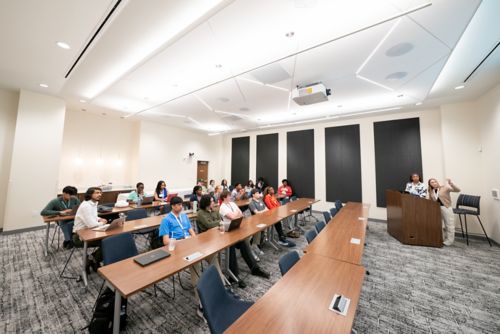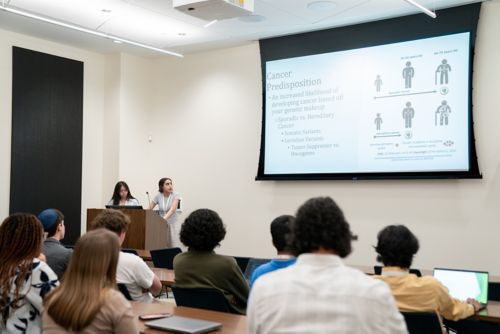St. Jude Family of Websites
Explore our cutting edge research, world-class patient care, career opportunities and more.
St. Jude Children's Research Hospital Home

- Fundraising
St. Jude Family of Websites
Explore our cutting edge research, world-class patient care, career opportunities and more.
St. Jude Children's Research Hospital Home

- Fundraising
Datasets inspire mindsets for future scientists

Participants in the High School Research Immersion program take part in a data science seminar, where they explore foundational concepts in data science through interactive lectures.
When people think of data science, algorithms, big data and tech giants come to mind. However, data science is woven into our everyday lives. Understanding the basic principles, such as how to interpret trends, ask the right questions and make data-driven decisions, can empower students to navigate the world more critically and confidently.
Knowing the transformative potential of data science, Ninad Oak, PhD, St. Jude Department of Oncology, and scientists from the Center for Applied Bioinformatics (CAB) launched a seminar series to engage high school students in this rapidly evolving field. The effort originated when Evadnie Rampersaud, PhD; Gang Wu, PhD, of the CAB; and Oak began co-mentoring a group of students on bioinformatics-focused projects as part of the STEMM Education & Outreach Program’s High School Research Immersion (HSRI) program. The HSRI program is an eight-week summer experience that allows students to participate in mentored research projects at St. Jude.
“We noticed that the students came from diverse backgrounds with varying levels of training,” explained Oak. “So, we started this seminar series to help them build a foundation in bioinformatics, genomics and sequencing technologies used at St. Jude, as well as the core concepts underlying these fields.”
The data science seminar consists of interactive lectures from St. Jude scientists, covering topics such as statistical genetics, using data to uncover the causes of cancer, immunology, the fundamentals of sequencing technologies and the applications of artificial intelligence in biomedical sciences.
“By exposing attendees to the breadth of these fields, we hope they find inspiration in one or more areas and envision themselves contributing to scientific research in the future,” said Oak.
Practice builds confidence
In addition to gaining technical knowledge and expertise, the seminar provides students with opportunities to develop essential soft skills that will benefit them in the future. Throughout the seminar series, there are two sets of student-led presentations. Early in the series, they present background information to explain key concepts from their summer research projects, and later, they present their complete projects with their novel data and findings.

High School Research Immersion Program participants Dulce Ordonez (left) and Sarah Tayahi (right) present their research during the data science seminar.
These presentations not only foster peer discussion and collaboration but also help students refine their science communication skills, build confidence in answering questions thoughtfully, and learn to present their research with clarity and conviction.
After presenting her research to her peers in the data science seminar, Dulce Ordonez, a participant from Middle College High School, said, “We will soon be presenting our research to people who are experts in the field, so it’s helpful to start practicing on a smaller scale. That way, we can build confidence and become more comfortable sharing our work with different audiences.”
Enhancing exposure to diverse STEMM disciplines
The overall goal of the seminar series is to enhance the HSRI summer research experience. It does so by providing classroom-based learning opportunities that complement students’ laboratory-based research projects. The seminar series also broadens their exposure to other research areas, offering insights into the diverse opportunities in science.
“Listening to the lectures has expanded my knowledge beyond my particular research area. I’ve learned about other areas of research that I didn’t even know existed,” said Sarah Tayahi, a participant from Houston High School. “St. Jude is so diverse; there are so many people with different specialties.”
This exposure to diverse fields has inspired Ordonez to explore how her personal experiences and interests can shape her scientific journey. “I’ve always found the brain interesting, especially because of my dad’s experience with a brain tumor,” she explained. “Since participating in the seminar, I’ve been drawn to combining my interest in the brain with genetics and how it can play a role in developing cancer.”
“We want to expose the students to the many different fields within STEMM. If even one sparks their interest or helps them see themselves as future scientists, that’s a huge win,” said Oak.
Feedback for the future
Attending the data science seminar series is optional for students participating in the HSRI program, yet many choose to take part because they are genuinely curious. Feedback from previous students who participated in the data science seminar has been positive. This year, about 50% of the entire HSRI cohort is participating in the series.
“I recently learned that a few students who participated in the series last year were admitted to prestigious universities with full-ride scholarships,” said Oak. “While I cannot say that it is because of the series, many students have overwhelmingly stated that their learning experience wouldn’t have been as enriching without it.”
Oak has plans to expand the series in the coming years by incorporating a more hands-on approach to data science. “We’re considering implementing a hands-on project where students collaborate with scientists to perform coding data analysis to solve real-world challenges,” he said. “I think this would be an exciting and meaningful way to enhance the series and foster deeper engagement.”






